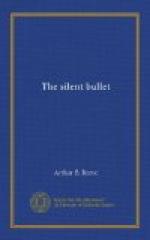“Really,” he remarked, laying down his fountain-pen and lighting his cigar for the hundredth time, “the more one thinks of how the modern criminal misses his opportunities the more astonishing it seems. Why do they stick to pistols, chloroform, and prussic acid when there is such a splendid assortment of refined methods they might employ?”
“Give it up, old man,” I replied helplessly, “unless it is because they haven’t any imagination. I hope they don’t use them. What would become of my business if they did? How would you ever get a really dramatic news feature for the Star out of such a thing? ’Dotted line marks route taken by fatal germ; cross indicates spot where antitoxin attacked it’—ha! ha! not much for the yellow journals in that, Craig.”
“To my mind, Walter, it would be the height of the dramatic—far more dramatic than sending a bullet into a man. Any fool can shoot a pistol or cut a throat, but it takes brains to be up-to-date.”
“It may be so;” I admitted, and went on reading, while Kennedy scratched away diligently on his lecture. I mention this conversation both because it bears on my story, by a rather peculiar coincidence, and because it showed me a new side of Kennedy’s amazing researches. He was as much interested in bacteria as in chemistry, and the story is one of bacteria.
It was perhaps a quarter of an hour later when the buzzer on our hall door sounded. Imagine my surprise on opening the door to discover the slight figure of what appeared to be a most fascinating young lady who was heavily veiled. She was in a state almost bordering on hysteria, as even I, in spite of my usual obtuseness, noticed.
“Is Professor Kennedy in?” she inquired anxiously.
“Yes, ma’am;” I replied, opening the door into our study.
She advanced toward him, repeating her inquiry.
“I am Professor Kennedy. Pray be seated,” he said.
The presence of a lady in our apartment was such a novelty that really I forgot to disappear, but busied myself straightening the furniture and opening a window to allow the odour of stale tobacco to escape.
“My name is Eveline Bisbee,” she began. “I have heard, Professor Kennedy, that you are an adept at getting at the bottom of difficult mysteries.”
“You flatter me;” he said in acknowledgment. “Who was so foolish as to tell you that?”
“A friend who has heard of the Kerr Parker case,” she replied.
“I beg your pardon,” I interrupted, “I didn’t mean to intrude. I think I’ll go out. I’ll be back in an hour or two.”
“Please, Mr. Jameson—it is Mr. Jameson, is it not?”
I bowed in surprise.
“If it is possible I wish you would stay and hear my story. I am told that you and Professor Kennedy always work together.”
It was my turn to be embarrassed by the compliment.




